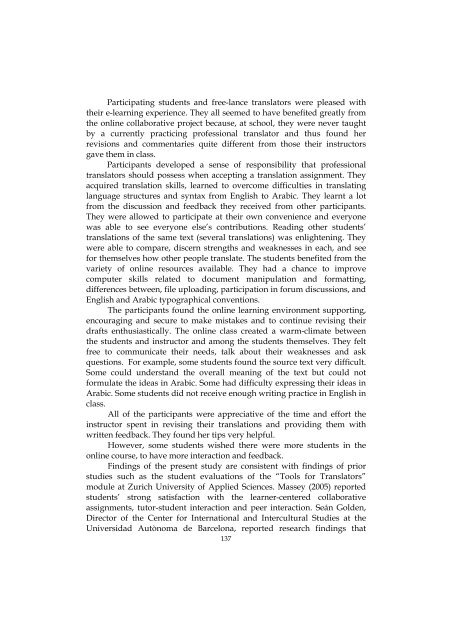translation studies. retrospective and prospective views
translation studies. retrospective and prospective views
translation studies. retrospective and prospective views
Create successful ePaper yourself
Turn your PDF publications into a flip-book with our unique Google optimized e-Paper software.
Participating students <strong>and</strong> free-lance translators were pleased with<br />
their e-learning experience. They all seemed to have benefited greatly from<br />
the online collaborative project because, at school, they were never taught<br />
by a currently practicing professional translator <strong>and</strong> thus found her<br />
revisions <strong>and</strong> commentaries quite different from those their instructors<br />
gave them in class.<br />
Participants developed a sense of responsibility that professional<br />
translators should possess when accepting a <strong>translation</strong> assignment. They<br />
acquired <strong>translation</strong> skills, learned to overcome difficulties in translating<br />
language structures <strong>and</strong> syntax from English to Arabic. They learnt a lot<br />
from the discussion <strong>and</strong> feedback they received from other participants.<br />
They were allowed to participate at their own convenience <strong>and</strong> everyone<br />
was able to see everyone else’s contributions. Reading other students’<br />
<strong>translation</strong>s of the same text (several <strong>translation</strong>s) was enlightening. They<br />
were able to compare, discern strengths <strong>and</strong> weaknesses in each, <strong>and</strong> see<br />
for themselves how other people translate. The students benefited from the<br />
variety of online resources available. They had a chance to improve<br />
computer skills related to document manipulation <strong>and</strong> formatting,<br />
differences between, file uploading, participation in forum discussions, <strong>and</strong><br />
English <strong>and</strong> Arabic typographical conventions.<br />
The participants found the online learning environment supporting,<br />
encouraging <strong>and</strong> secure to make mistakes <strong>and</strong> to continue revising their<br />
drafts enthusiastically. The online class created a warm-climate between<br />
the students <strong>and</strong> instructor <strong>and</strong> among the students themselves. They felt<br />
free to communicate their needs, talk about their weaknesses <strong>and</strong> ask<br />
questions. For example, some students found the source text very difficult.<br />
Some could underst<strong>and</strong> the overall meaning of the text but could not<br />
formulate the ideas in Arabic. Some had difficulty expressing their ideas in<br />
Arabic. Some students did not receive enough writing practice in English in<br />
class.<br />
All of the participants were appreciative of the time <strong>and</strong> effort the<br />
instructor spent in revising their <strong>translation</strong>s <strong>and</strong> providing them with<br />
written feedback. They found her tips very helpful.<br />
However, some students wished there were more students in the<br />
online course, to have more interaction <strong>and</strong> feedback.<br />
Findings of the present study are consistent with findings of prior<br />
<strong>studies</strong> such as the student evaluations of the “Tools for Translators”<br />
module at Zurich University of Applied Sciences. Massey (2005) reported<br />
students’ strong satisfaction with the learner-centered collaborative<br />
assignments, tutor-student interaction <strong>and</strong> peer interaction. Seán Golden,<br />
Director of the Center for International <strong>and</strong> Intercultural Studies at the<br />
Universidad Autònoma de Barcelona, reported research findings that<br />
137












